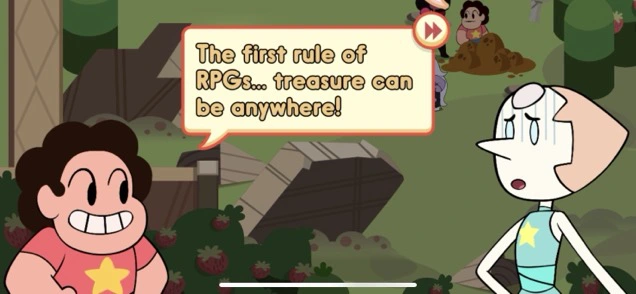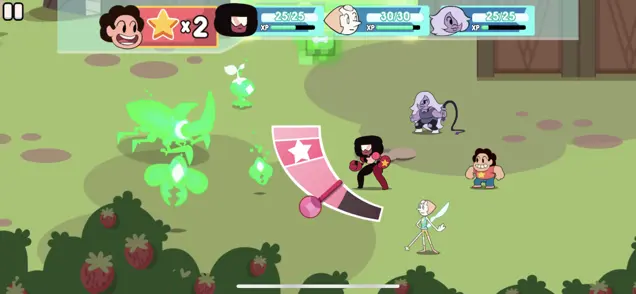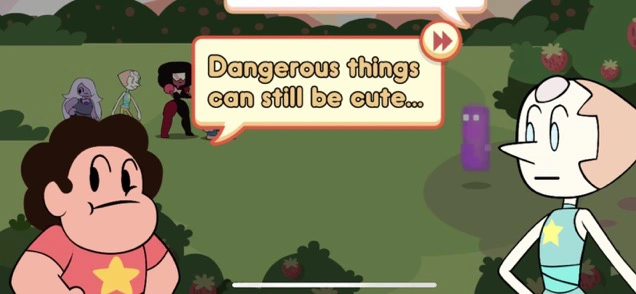by Dan McAlister
Steven Universe: Attack The Light is a Role-Playing Game (RPG) for mobile devices that’s perfect for fans of the show, fans of RPGs, and folks who are new to both.
What Is It
For those not familiar, Steven Universe is a popular cartoon show about a young boy named Steven being raised by the Crystal Gems, a trio of millenia-old alien warriors. The show is equal parts goofy coming-of-age comedy and magical adventure epic; in a given episode, the heroes are just as likely to fight space monsters as they are to bicker over what Steven should be eating for breakfast.
Steven Universe: Attack the Light is unremarkable in its story. Steven accidentally unleashes a magical threat, and it’s up to the group to travel far and wide, fighting monsters and saving the day. But what the game nails are the show’s wonderful characters. Steven is young, positive, openly loving, and naive about the world. Pearl is elegant and precise, but also fussy and neurotic. Amethyst is fiercely individual and wild. And their leader Garnet is stoic and composed, yet compassionate. Steven Universe is a show about Steven exploring the world, exploring who he is, growing up, and dealing with the changes that arise on the journey. But vitally, all of these characters are changing and growing, even the ones who don’t think they have more to learn after thousands of years.
All of these qualities come out in the game’s story and dialogue. But remarkably, these characters and their relationships are evoked in the game’s core combat system as well.
Why I Love It

In Steven Universe: Attack the Light, most of the combat mechanics express something about the characters and their relationships to each other. First, a primer: like in most RPGs, you the player control all four members of your party at once. Every turn in combat, you’re given five “stars” that can be spent on any unit’s action. More powerful actions cost more stars, so you have to strategically allocate your resources.
For instance: Pearl’s basic attacks are efficient, targeting single enemies and expending only one star. Amethyst is more reckless: her attack hits all foes at once for low damage, and consume 3 stars. All four party members start with basic maneuvers that expand over time, giving you more options that always compliment the characters’ personality and style.

This sense of character is even expressed in the most mundane places. Rather than start every character at level 1, only Steven starts as a level 1 adventurer, while his guardians, who have been adventuring for millenia, start at level 9001. And you’ll periodically need to take sides in minor disputes between characters. I found myself stepping between Pearl and Amethyst on more than one strategic discussion, more often siding with Amethyst because I felt she needed more emotional support. These discussions effectively develop characters, and allocate experience to the characters you side with, even if they have little impact on the direction of the story.
Also worth mentioning is how thoughtful the developers have been in developing an RPG, traditionally the territory of consoles and PCs, for mobile. Attacks are tactile, requiring users to drag their finger to aim or tap to a rhythm to unlock a move’s full power. Exploring the environment smartly eschews traditional movement. Instead, each room is the size of your phone’s screen, and you swipe your finger to instantly transition rooms. Everything here feels carefully thought out, and it comes together as a wonderfully cohesive whole.
Getting Started

The game offers two difficulty levels. As an experienced player, I breezed through Attack the Light on the normal difficulty, but “Diamond” difficulty removes visual cues used to help time attacks and blocks, making it difficult to recommend for a first time player. Regardless, the earlier stages are going to be easier, so use that time to assess each character’s strengths and weaknesses, which will help your decision making when things get really tough.
Going Further
Two sequels have been released for this game, Save the Light for consoles and PC, and Unleash the Light for Apple Arcade. Also, if you haven’t experienced the show, it’s a real treat. Steven Universe is one of the more wholesome, loving stories in American pop culture today. It’s sweet and light, and builds up emotional weight slowly over time. It’s not immediately gripping, but it's great to hang out with and chill. In both TV and game form, I highly recommend it.
The opinions in this post are expressly the views of the author and do not reflect the views of their employer(s) or any entities that they might otherwise be affiliated.